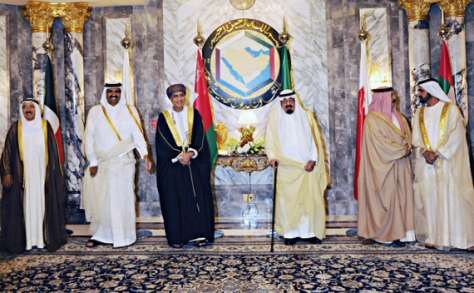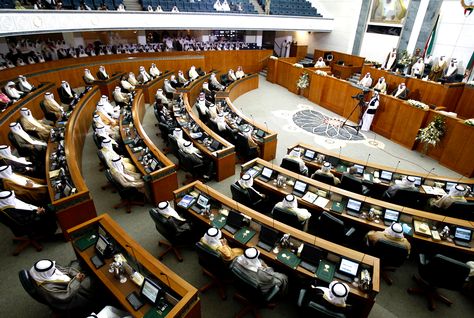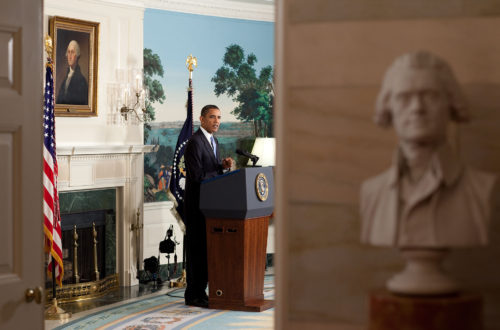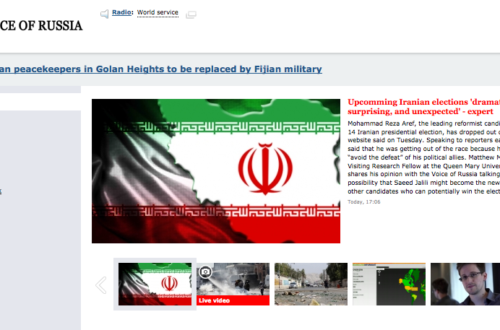The Gulf region has proven to be one of the fastest developing areas in the world with enormous wealth and vast supplies of oil and gas.[1] It was, indeed, the emergence of oil that determined the virtual turning point in the history of the whole Arabian Peninsula. The previously tribal and poor lands of the Arabian Desert; historically populated mostly by the pearl divers, camel breeders and some local pirates; that until late 1930s had never even drawn much interest of the colonial powers, suddenly became the major exporters of oil – the most wanted natural resource of the day.[2] The advent of the oil era importantly changed the internal mechanisms of the Gulf States, as the exogenous rent became the predominant source of national income – a phenomenon claimed to have major implications for the politics of the region.[3]
 |
| Credits: Council on Foreign Relations |
The first use of the ‘rentier state’ concept dates back to Hossein Mahdavy’s description of the pre-revolutionary Pahlavi regime in Iran in 1970.[4] However, it was only twenty years later that Beblawi and Luciani essentially mastered the theory of rentierism in their contributions to a book on the effects of the oil-boom in the Gulf.[5] Beblawi has since advanced, after Marshall, that a rentier state extracts its entire national revenue, or a substantial portion thereof,[6] from the rent of its indigenous resources – “the gifts of nature.”[7]
“However, Beblawi and Luciani [also] argued,” as noticed by Schwarz, “that the rentier effects are not confined to the oil-exporting states alone,”[8] and the notion of rent was then extended to the revenues accrued from other strategic resources, such as: the access to major watercourses (i.e. the Suez), the overseas investment (i.e. the revenue secured by Qatar Investment Authority QIA and its famous real estate branch – the Qatari Diar), migrant workers’ remittances, transit fees or even the bilateral or multilateral foreign-aid payments (i.e. humanitarian assistance, foreign development assistance or military assistance; Egypt is by far the best regional example of such a phenomenon).[9]
Moreover, the theory of rentierism further argues that the rents accumulated from the external state and non-state actors would be internally generated by only a small fraction of the entire society and that, perhaps most significantly so, the state is the main first-line recipient of the thereby generated wealth, which then is expected to be widely redistributed among the citizens in, what Luciani calls, a truly “allocative system”.[10]
Rent Accrual Undermines Prospects for Democratisation
The often-highlighted direct link between the rent accrual, its subsequent distribution, and the political representation, or state accountability, is by far the most fundamental political aspect of rentierism. It has become widely agreed, “The history of democracy owes its beginnings … to some fiscal association (no taxation without representation),” argues Beblawi.[11] Therefore, in his description of the Arab rentier states Luciani contrasts them to their Western democratic counterparts and notes, “a state that economically supports society and is the main source of private revenues through government expenditures, while in turn is supported by revenue accruing from abroad, does not need to respond to society.”[12]
Although rentierism does mostly appear to strengthen or even perpetuate the authoritarian systems of governance in the developing world, it does not fully preclude the possibility of liberalisation, which often does take place despite the rentier state arguments.[13] It is suggested here that the rentier state theory fails to address all the contributing cultural and political aspects of the Arab Gulf states, thus oversimplifying the local political dynamics and distorting the possible political prognosis for the region.[14]
While it is far too simplistic to blindly follow Kerr’s argument “that power grows (…) out of an ample state Treasury,”[15] the state’s wealth and strong financial position may certainly help facilitating the process of stabilising the state. Rentierists believe that there is a strong positive correlation between the actual rent and the strength of the state’s authoritarian system. The notion of ‘buying off’ the popular consent, which in turn grants the legitimacy of the regime, is central to their argument.[16] Luciani indicates, “Revenue from abroad dramatically improves the state’s ability to buy legitimacy through allocation and increases regime stability.”[17]
The rentier state theorists fully support the argument that “the political economy of rentierism, at least in its Middle Eastern manifestation, has helped strengthen authoritarianism and has undermined prospects for democratisation, especially in the oil monarchies,” as noted by Al-Naqeeb.[18] However, it is also important to notice that the Gulf regimes have not become any more authoritarian since the emergence of oil. In fact there has been a considerable shift towards liberalisation across the entire Gulf.[19] Both Krause and Clark agree that the rentier state theory simply ‘ignores’ both the positive impact of oil on the civil society and the fact that it often proves to be the very case for liberalisation.[20]
Wealthy rentier states, such as Qatar, Kuwait, Bahrain, Saudi Arabia or the United Arab Emirates (UAE), inevitably end up transforming their systems into a typically allocative/distributative one, where the ruling elites allot their rent income to the citizens of the state. The notion of citizenship becomes a truly financial asset and helps creating a very clear distinction between the ‘have’ and ‘have not’ members of the society. Hazem Beblawi notes, “Citizenship is not only an effective relation between man and his homeland, it is also, or primarily, a pecuniary relation.”[21] Therefore, loyalty to the local ruling elite, argues Gause III, becomes widely accepted or at least preferred, as the “individuals find their personal economic interests vested directly in the state.”[22] Hirschman then notes that ‘exiting’ the local or national community can be easily translated into very tangible financial losses and therefore, dissent is rare.[23]
As a result of the claimed relative equation between the interest of the state and the interest of citizens, rentier state theorists argue that the likelihood of rebellion and revolution strongly diminishes, as people would rather strive for their prosperity than engage in regime changes. Benjamin Smith claims, “(…) the ability of the state to placate important social groups by paying them off with oil revenues should allow regimes to survive long after they would otherwise be able to.”[24]
Similarly, distribution of the oil revenues in the form of extensive welfare state apparatus is also being used as a regular policing tool.[25] Denial of the state benefits through deportations or denationalisation is used against those who oppose the ruling elite.[26] Although securing the popular endorsement through efficient allocation of the oil revenues may well demonstrate somewhat higher likelihood of maintaining the state stability, it undoubtedly does not assure the total absence of revolution or even its probability.
Rentier States Liberalise
Nonetheless, it has become manifest and indisputable that the Gulf, including Qatar, has recently seen an unprecedented move towards liberalising the social and political life.[27] Although both the extent and the inherent meaning of this liberalisation project remain disputable, the fact that a move away from the very austere authoritarianism has taken off proves the fundamental limitation of this theory. Most of the rentier state theorists argue that such shifts only come about in times of the economic bust and remain as carefully limited temporary measures of securing legitimacy for the regimes but do not change the overall political structures in the long term.
 |
| Credits: Arabian Business |
The recent liberalisation projects of Qatar, Kuwait, Bahrain or even Saudi Arabia, to a certain degree, contradict this theory. In fact, I would argue that there is very little actual correlation between the fluctuation of the oil prices and the process of liberalisation in the Gulf. Majority of the Gulf Cooperation Council (GCC) states have not experienced any major bust, yet they continue to exercise a significant degree of political change. Moreover, the fact that this development has originated at the very top of the political system and that it is largely instigated by the Sheikh Hamad bin Khalifa Al Thani, the Emir of Qatar himself demonstrate the shortcomings of the rentier state theory that sees no incentive for the regime to encourage political liberalisation in the times of either the boom or relative stability. Nonetheless, it does lead to a conclusion that the oil revenues and the vast riches of the state made the regimes “absolutely independent” internally, yet, even despite the local political apathy and a lack of widespread popular demand for democratisation, they continue to liberalise.[28]
Matthew Machowski © 2010
[1] However, there is still a wide range of areas, such as social development, the human rights, the accountability of the governments, the health care and health promotion, etc., where the Gulf States development proves to be slow
[2] The British East India Company initially set up the Persian Gulf Residency –the official colonial subdivision of the British Empire – in 1763 at Bušehr in Persia. For the majority of its existence till 16 December 1971 the Arabian Gulf did not play a major role in the British existence in the region. Up until the discovery of the major oil resources in Bahrain in 1932, Saudi Arabia in 1933 and Qatar in 1940 the British interests in the region were constrained mostly to securing safe shipments between the British East India Company (succeeded by the British Raj), and England. It was only in the late 19th and early 20th century that the British Imperial government started taking any concrete interest in the non-Persian part of the Gulf by establishing the trucial states in Bahrain in 1861, Oman in 1892, Kuwait in 1914, Qatar in 1916 and finally Dubai in 1939.
[3] Hendrik van der Meulen, The Role of Tribal and Kinship Ties in the Politics of the United Arab Emirates, Ph.D. dissertation (Medford: Fletcher School of Law and Diplomacy, Tufts University, 1997): 6.
[4] Douglas A Yates, The Rentier State in Africa: Oil Rent Dependency and Neocolonialism in the Republic of Gabon (Trenton, NJ: Africa World Press, 1996): 11. For further details see: Hossein Mahdavy, “The Pattern and Problems of Economic Development in Rentier States: The Case of Iran,” Sudies in the Economic History of the Middle East (Oxford University Press), 1970.
[5] Giacomo Luciani, “Allocation vs. Production States: A Theoretical Framework,” in The Arab State, ed. Giacomo Luciani (Berkeley: University of California Press, 1990): 65-84.
[6] Although Beblawi and Luciani do not clearly specify the percentage of the national revenue required to be accrued from overseas in order to constitute a rentier state, F. Gregory Gause III advances that a rentier state “government relies for the lion’s share of its revenues (certainly over 50 per cent, in the Gulf monarchies usually 75 per cent) on direct transfers from the international economy.” Meulen on the other hand argues for a 40 per cent benchmark. See: F. Gregory Gause III, Oil Monarchies: Domestic and Security Challenges in the Arab Gulf States (New York: Council on Foreign Relations Press, 1994): 43; and Meulen, op. cit., 51.
[7] Beblawi, Hazem. “The Rentier State in the Arab World.” In The Arab State, edited by Giacomo Luciani, 85-98. London: Routledge, 1990: 49.
[8] Rolf Schwarz, “State Formation Processes in Rentier States: The Middle Eastern Case,” in Fifth Pan-European Conference on International Relations – “International Relations Meet Area Studies” (Hague: ECPR Standing Group on International Relations, Section 34, 9-11 September 2004): 14.
[9] Kevin Morrison notes: “Research has indicated that foreign aid is a highly fungible resource and acts similarly to oil in the sense that it provides extra resources the government can use to distribute to its key constituencies without taxation.” See: Kevin Morrison, “Oil, Non-Tax Revenue, and Regime Stability: The Political Resource Curse Reexamined,” in Harvard University Comparative Political Economy Workshop (Cambridge, MA, 2005): 5; and Tarhan Feyzioglu, Vinaya Swaroop and Min Zhu, “A Panel Data Analysis of the Fungibility of Foreign Aid,” World Bank Economic Review 12 (1998): 29-58.
[10] Benjamin Smith also recognises this characteristic and indicates that in the hereby discussed circumstances “the government [normally] evolves from an extractive state into a distributive one.” See: Luciani as cited in Nazih N Ayubi, Over-stating the ArabState: Politics and Society in the Middle East (London: I.B. Tauris, 1999): 453; and Benjamin Smith, “Oil Wealth and Regime Survival in the Developing World, 1960–1999,” American Journal of Political Science 48, no. 2 (April 2004): 233.
[11] Beblawi, op.cit., 89.
[12] Giacomo Luciani, “Resources, Revenues, and Authoritarianism in the Arab World: Beyond the Rentier State,” in Political Liberalization and Democratization in the Arab World: Theoretical Perspectives, ed. Rex Brynen, Bahgat Korany and Paul Noble, 211-228 (Boulder and London: Lynne Rienner Publishers, 1995): 211.
[13] Although the current body of research mostly appears to support the causal link between the oil wealth and the perpetuation of the authoritarian rule, and the regime stability, there has been a significant counterargument in the study of Benjamin Smith, who argues, “… the durability effect appears to have been independent of consistent access to rents with which regimes can buy legitimacy.” See: Smith, Benjamin. “Oil Wealth and Regime Survival in the Developing World, 1960–1999.” American Journal of Political Science 48, no. 2 (April 2004): 242.
[14] It is sometimes argued that rentierism significantly omits the following: the history of authoritarian rule in the region, the patterns of tribalism and the Bedouin culture of decision-making, the patrimonialism of the Arab nations (all the above aspects are discussed in some further detail later in this dissertation), the impact of Islam on the political life of modern Arab monarchies, the existence of Islamism and its implications for the current regimes, the patterns of characteristically modern Arab monarchism, the repressive state apparatus and finally the sectarian Sunni/Shi’a divide.
[15] Malcolm H. Kerr and Yāsīn al-Sayyid, Rich and Poor States in the Middle East: Egypt and the New Arab Order, ed. Malcolm H. Kerr and Yāsīn al-Sayyid (Boulder: Westview Press, 1982), p. 1.
[16] This has been widely discussed by Chaudry, Crystal and Smith. See: Kiren Aziz Chaudhry, The Price of Wealth: Economies and Institutions in the Middle East (Ithaca: Cornell University Press, 1997); Crystal (1989), op. cit.; Smith, op.cit., 233 respectively.
[17] Terry Karl also supports this notion and argues that oil significantly strengthens the regimes and prolongs the periods of political stability. Luciani (1990), op. cit., 76; and Terry Karl, The Paradox of Plenty: Oil Booms and Petrostates (Berkeley: University of California Press, 1997): 20-21.
[18] Smith also notes in his statistical research of the Gulf States rentierism, “Oil dependence is a positive predicator of durability, but at the same time is negatively related to democracy.” Al-Naqeeb, Khaldoun Hasan. Society and State in the Gulf and Arab Peninsula: A Different Perspective. Translated by L. M. Kenny. London and New York: Routledge, 1990: 404; and Smith, op. cit., 238.
[19] For a more detailed discussion of this argument see: Michael L. Ross, “Does Oil Hinder Democracy?,” World Politics 53 (APRIL 2001): 331.
[20] See: John Clark, “Petro-politics in Congo.,” Journal of Democracy 8, no. 3 (1997): 62-76; and Wanda Krause, Gender and Participation in the Arab Gulf., Research Paper (London: Kuwait Programme on Development, Governance and Globalisation in the Gulf States, 2009): 5.
[21] Beblawi, op. cit., 88.
[22] Teitelbaum calls this phenomenon “an alliance for profits”, whereby the citizens remain complacent about the state domination due to the expectations of financial profits that are associate therewith. Gause III (1994), op. cit., 58; and Joshua Teitelbaum, “Understanding Political Liberalization in the Gulf: An Introduction,” in Political Liberalization in the Persian Gulf (New York: Columbia University Press, 2008): 15.
[23] A. O. Hirschman, “The Political Economy of Import Substituting Industrialisation in Latin America,” The Quarterly Journal of Economics 82, no. 1 (1968): 1-32.
[24] Smith, op. cit., 233.
[25] Micheal Ross makes is among the strongest supporters of such argument, where he suggests that oil not only threatens the creation of democracy but also serves as a form of “fiscal pacification.” See: Ross, op. cit.
[26] Gause III (1994), op. cit., 43.
[27] Although outlining the boundaries of the Middle East is a widely disputed issue among the Western and Middle Eastern scholars, whenever the author refers to the “Middle East” one should understand that the following regions are discussed here: the Mashreq (the Arabic speaking countries to the Levant – east of Egypt and north of the Arabian Peninsula), the Maghreb (Algeria, Tunisia, Libya, Morocco and Mauretania), the Arabian Peninsula and finally Egypt.
[28] Ahmed Abdelkareem Saif, “Deconstructing Before Building: Perspectives on Democracy in Qatar,” in Reform in the Middle East Oil Monarchies, ed. Steven Wright and Anoushiravan Ehteshami (Reading: Ithaca Press, 2008): 113. For similar argument see: Al-Naqeeb, op. cit., 82.



